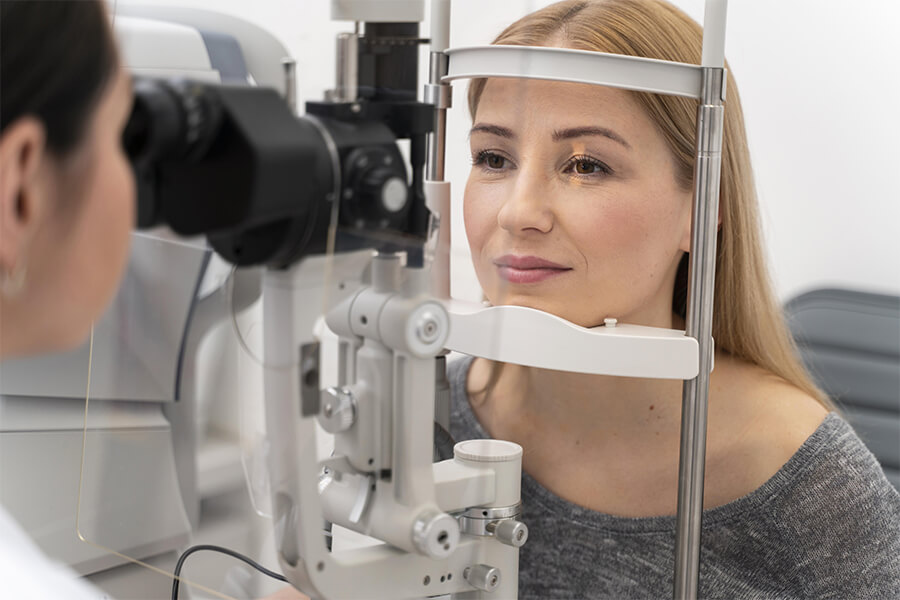
24 Aug Importance of Regular Eye Exams for Optical Lenses Wearers
Introduction
Regular eye exams are crucial for maintaining optimal eye health and vision, especially for individuals who wear optical lenses. Whether you use glasses or optical lenses, routine eye exams play a vital role in ensuring that your prescription is up to date and your eyes are in good condition. In this article, we will explore the importance of regular eye exams for optical lens wearers, highlighting the benefits they provide in terms of vision correction, early detection of eye conditions, and overall eye health.
The Importance Of Regular Eye Exams
-
Accurate Prescription and Vision Correction
Regular eye exams are essential for optical lens wearers to ensure their prescription remains accurate. Over time, the eyes can change vision, requiring adjustments to the lens power. By scheduling routine eye exams, optometrists can assess your visual acuity, measure the refractive errors, and provide an updated prescription for your optical lenses. Wearing lenses with the correct prescription not only ensures clear vision but also reduces eye strain, headaches, and discomfort.
-
Early Detection of Eye Conditions
Eye exams are not only about vision correction; they also serve as crucial screenings for detecting eye conditions and diseases. Many eye conditions, such as glaucoma, macular degeneration, and cataracts, develop gradually and may not exhibit noticeable symptoms in the early stages. Regular eye exams allow optometrists to examine the internal and external structures of your eyes, checking for signs of any abnormalities or potential eye health issues. Early detection of these conditions increases the chances of successful treatment and management, preserving your vision and overall eye health.
-
Assessment of Eye Health
Go beyond evaluating your vision; they also assess the overall health of your eyes. Optometrists examine the various components of your eyes, including the cornea, iris, lens, and retina. They can identify any signs of dryness, inflammation, infections, or other abnormalities that may require attention. Additionally, optometrists may evaluate the effects of prolonged lens wear on your eyes, checking for conditions such as contact lens-induced keratitis or corneal abrasions. Regular eye exams provide an opportunity for early intervention and appropriate management of any eye health concerns.
-
Prescription Updates for Changing Lifestyles
Your visual needs may change as your lifestyle evolves. Regular eye exams allow optometrists to assess any changes in your visual demands and recommend lens options that better suit your lifestyle. For instance, if you spend a significant amount of time working on a computer, optometrists may suggest lenses with blue light protection or computer-specific prescriptions to reduce eye strain and digital eye fatigue. Similarly, if you engage in outdoor activities, they may recommend lenses with UV protection to safeguard your eyes from harmful sun exposure. Updating your optical lenses based on your changing visual needs ensures that you have the most appropriate eyewear for your activities and helps maintain optimal visual comfort.
-
Preventative Eye Care and Education
Eye exams provide an opportunity for preventative eye care and education. Optometrists can offer guidance on maintaining good eye health, including tips on proper lens care, hygiene practices, and lifestyle modifications. They can educate you on eye-friendly habits such as taking breaks during prolonged screen time, maintaining proper lighting conditions, and protecting your eyes from environmental factors. By staying informed and following their recommendations, you can actively participate in preserving your eye health and preventing potential vision problems.
Conclusion
Regular eye exams are of utmost importance for optical lens wearers. These exams ensure accurate prescriptions, early detection of eye conditions, assessment of overall eye health, and updates based on changing visual needs. By prioritizing routine eye exams, you can maintain clear vision, detect and manage eye conditions in their early stages, and take proactive steps toward optimal eye health. Don’t underestimate the significance of regular eye exams in safeguarding your vision and enjoying the best possible eye care.

No Comments